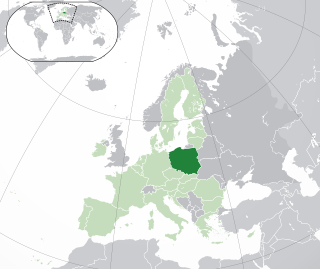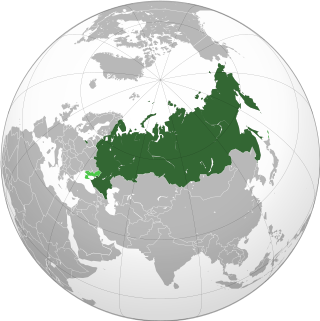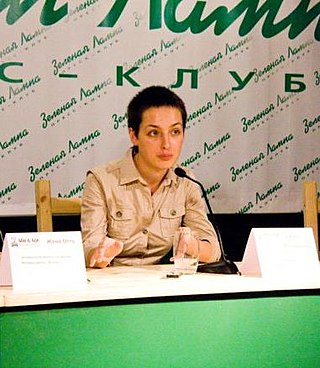
Lesbian, gay, bisexual, and transgender (LGBT) people in Poland face legal challenges not experienced by non-LGBT residents. According to ILGA-Europe's 2023 report, the status of LGBTQ rights in Poland is the worst among the European Union countries.

In the Russian Federation, lesbian, gay, bisexual, and transgender (LGBT) people face significant challenges not experienced by others. Although sexual activity between people of the same sex is legal, homosexuality is disapproved of by most of the population, pro-LGBT advocacy groups are deemed extremist and banned, and it is illegal for individuals to "promote homosexuality"; in addition, same-sex couples and households headed by same-sex couples are ineligible for the legal protections available to opposite-sex couples. Russia provides no anti-discrimination protections for LGBT people and does not have a designation for hate crimes based on sexual orientation and gender identity. Transgender people are not allowed to change their legal gender and all gender-affirming care is banned. There are currently no laws prohibiting discrimination based on gender identity or expression, and recent laws could be used to discriminate against transgender residents.

Lesbian, gay, bisexual and transgender (LGBT) rights in Australia significantly advanced over the latter half of the twentieth century and early twenty-first century, and are now ranked among the highest in the world. Opinion polls and the Australian Marriage Law Postal Survey indicate widespread popular support for same-sex marriage within the nation. A 2013 Pew Research poll found that 79% of Australians agreed that homosexuality should be accepted by society, making it the fifth-most supportive country surveyed in the world. With its long history of LGBT activism and annual Gay and Lesbian Mardi Gras festival, Sydney has been named one of the most gay-friendly cities in the world.

Lesbian, gay, bisexual, and transgender (LGBT) persons in Turkey face legal challenges not experienced by non-LGBT residents, though the general climate for LGBT people is considered to be less repressive when compared to most other Muslim-majority countries.

Lesbian, gay, bisexual, and transgender (LGBT) people in Albania face legal challenges not experienced by non-LGBT residents, although LGBT people are protected under comprehensive anti-discrimination legislation. Both male and female same-gender sexual activities have been legal in Albania since 1995, but households headed by same-sex couples are not eligible for the same legal protections available to opposite-gender couples, with same-sex unions not being recognized in the country in any form.

Lesbian, gay, bisexual, and transgender (LGBT) persons in Armenia face legal and social challenges not experienced by non-LGBT residents, due in part to the lack of laws prohibiting discrimination on the grounds of sexual orientation and gender identity and in part to prevailing negative attitudes about LGBT persons throughout society.

LGBT people in Azerbaijan face significant challenges not experienced by non-LGBT residents. Same-sex sexual activity has been legal in Azerbaijan since 1 September 2000. Nonetheless, discrimination on the basis of sexual orientation and gender identity are not banned in the country and same-sex marriage is not recognized.

Lesbian, gay, bisexual, and transgender (LGBT) people in Moldova face legal and social challenges and discrimination not experienced by non-LGBT residents. Households headed by same-sex couples are not eligible for the same rights and benefits as households headed by opposite-sex couples. Same-sex unions are not recognized in the country, so consequently same-sex couples have little to no legal protection. Nevertheless, Moldova bans discrimination based on sexual orientation in the workplace, and same-sex sexual activity has been legal since 1995.

Lesbian, gay, bisexual, and transgender (LGBT) persons in Kyrgyzstan face legal challenges not experienced by non-LGBT residents. Both male and female same-sex sexual activity are legal in Kyrgyzstan, but same-sex couples and households headed by same-sex couples are ineligible for the same legal protections available to opposite-sex married couples.
The Russian LGBT Network is a non-governmental LGBT rights organization working for the social acceptance of and protection of the rights of LGBT people in Russia. Founded in 2006, it was reformed into the first Russian inter-regional LGBT rights organization on October 19, 2008. The organization is a member of the International Lesbian and Gay Association (ILGA) and is led by Russian LGBT rights activist Igor Kochetkov.

Lesbian, gay, bisexual, and transgender (LGBT) people in North Macedonia face discrimination and some legal and social challenges not experienced by non-LGBT residents. Both male and female same-sex sexual activity have been legal in North Macedonia since 1996, but same-sex couples and households headed by same-sex couples are not eligible for the same legal protections available to opposite-sex married couples.

The history of lesbian, gay, bisexual and transgender people (LGBT) in Russia and its historical antecedents has largely been influenced by the political leanings of its rulers. Medieval Catholic-Protestant Europe had the largest influence on Russian attitude towards homosexuality. Russian LGBT history was influenced by the ambivalent attitude of the Russian Orthodox religiosity regarding sexuality.

Yelena Borisovna Mizulina is a Russian politician and lawyer. She served as a member of the State Duma between 1995 and 2003 and again between 2007 and 2015, and has been a member of the Federation Council since 2015.
During the lead-up to the 2014 Winter Olympics, protests and campaigns arose surrounding the rights of lesbian, gay, bisexual, and transgender (LGBT) people in Russia.

The Russian federal law "for the Purpose of Protecting Children from Information Advocating a Denial of Traditional Family Values", also referred to in English-language media as Russia's gay propaganda law or anti-gay law, is a bill that was unanimously approved by the State Duma on 11 June 2013, then unanimously approved by the Federation Council on 27 June 2013 and was signed into law by President Vladimir Putin on 30 June 2013.

Elena Gennadyevna Kostyuchenko is a Russian journalist and gay rights activist. She is an investigative reporter for the newspaper Novaya Gazeta.
Censorship of LGBT issues is practised by some countries around the world. They may take a variety of forms, including anti-LGBT curriculum laws in some states of the United States, the Russian gay propaganda law, and the Hungarian anti-LGBT law, and laws in Muslim-majority states such as Afghanistan, Saudi Arabia, Pakistan, and Malaysia prohibiting advocacy that offends Islamic morality.
Kyrgyz anti-LGBT propaganda law has been enacted on 14 August 2023. The bill was introduced on 17 March 2023 and will come into effect on 30 August 2023. The official title of the law is "On introducing amendments to several legal acts of the Kyrgyz Republic". It consists of amendments to the Code of Misdemeanors, the law "On measures to prevent harm to children's health, physical, intellectual, mental, spiritual and moral development in the Kyrgyz Republic", and the law "On Mass Media". The law expands the definition of "information harmful to the health and development of children" to include information that "denies family values, promotes non-traditional sexual relationships, and encourages disrespect for parents or other family members" and subjects those who disseminate such information among minors to fines.
Bayev and Others v. Russia was a case brought to the European Court of Human Rights by three Russian activists—Nikolay Bayev, Aleksei Aleksandrovich Kiselev, and Nikolay Alekseyev—alleging that the Russian gay propaganda law infringed on their freedom of expression guaranteed by Article 10 of the European Convention on Human Rights. On 20 June 2017, the court ruled that the applicants' freedom of expression had been compromised. The only dissent was from Dmitry Dedov, the judge elected with respect to Russia.



















